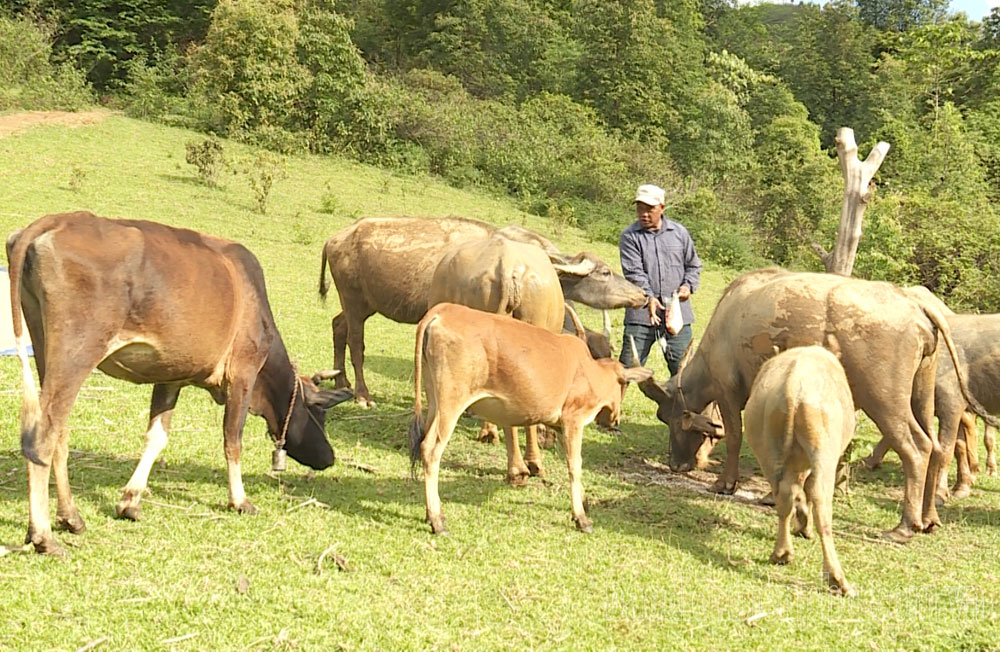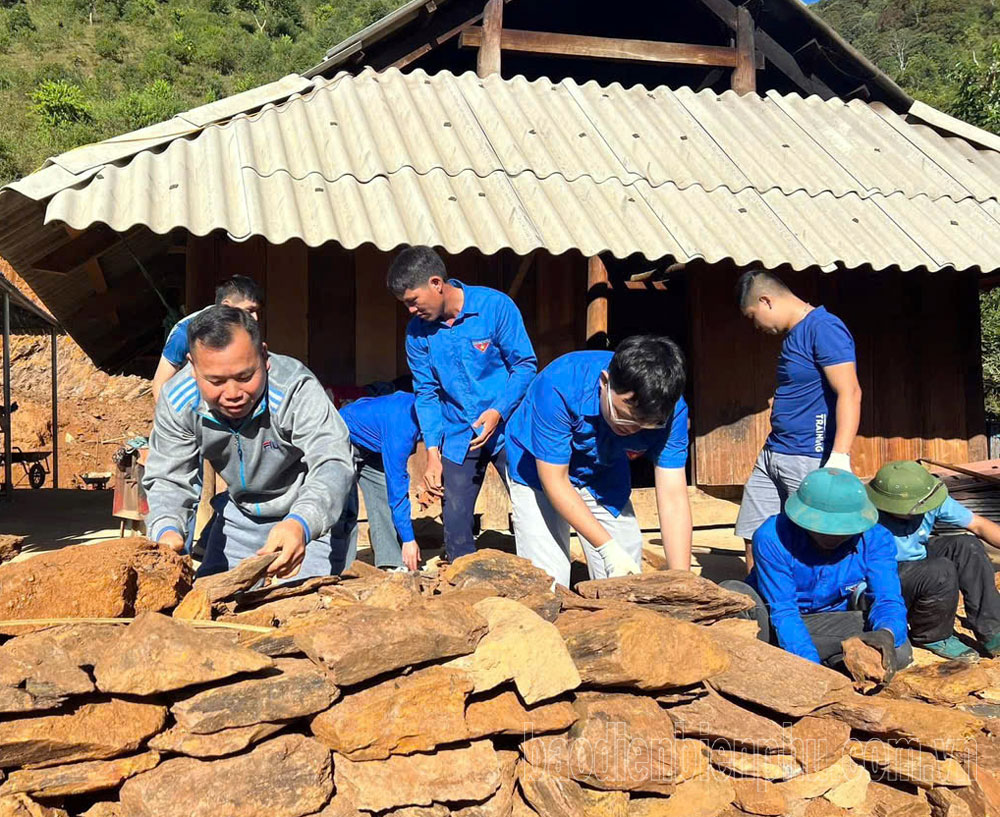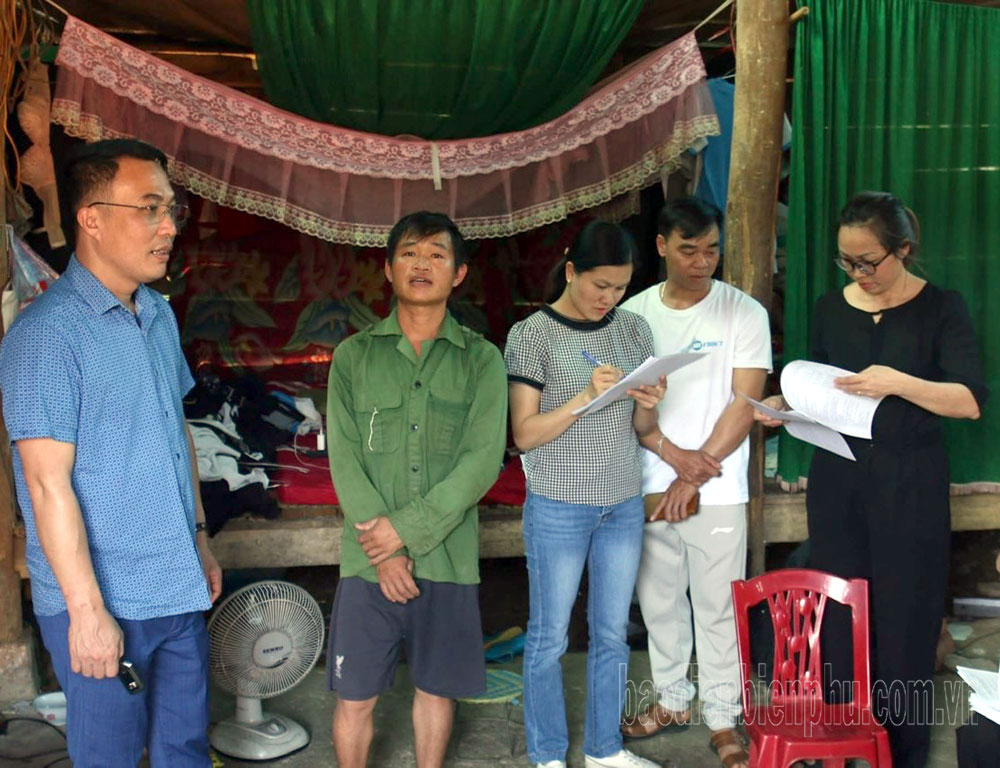A new life through vocational training
While farming and livestock rearing methods remain familiar, farmers in Mường Ảng District have shifted from small-scale, inefficient practices to applying modern techniques that boost productivity. This transformation has been driven by vocational training that equips farmers with essential skills and knowledge.
Quàng Văn Sinh, a resident of Ẳng Tở Commune, is a shining example of success after completing a training course on livestock husbandry and disease prevention for buffalo and cattle. The course was organised by the District Centre for Vocational and Continuing Education in partnership with local authorities. Sinh has meticulously implemented the recommended standards for livestock housing and feeding. Thanks to the techniques he learned, his herd of 10 cattle is thriving and reproducing successfully.

Quàng Văn Sinh tending to his family’s livestock.
Sinh said that his family used to struggle financially as their livestock farming failed to thrive, making life quite challenging. Like many households in the village, they followed traditional farming practices, feeding livestock whatever was available. When the animals got sick, they treated them on their own, leading to slow growth and limited development.
Realising that relying on traditional methods was ineffective, Sinh registered for a livestock training course held in the village in 2018. After the course, which included both theoretical learning and practical sessions, he gained a solid understanding of livestock farming. Applying these new skills, he was able to improve the health and productivity of his family’s livestock. Encouraged by his success, he willingly shared his knowledge and guided other villagers to help them improve their livelihoods.
To equip residents with the knowledge to enhance their farming and livestock practices, increase incomes, and achieve sustainable poverty reduction, Mường Ảng District conducted a survey on local vocational training needs. Based on the findings, the district planned and arranged training programmes tailored to the region’s requirements. According to the district’s Department of Labour, Invalids, and Social Affairs, from 2021 to 2024, the district organised 22 vocational training courses for 430 workers. These courses focused on practical skills, including livestock farming and disease prevention for livestock and poultry, safe vegetable cultivation, and the growing, care, harvesting, and preservation of coffee and mushrooms.
.jpg)
Residents of Ẳng Cang Commune participating in a vocational training course organised by the District Centre for Vocational and Continuing Education.
Đào Duy Thạch, Head of the Labour, Invalids, and Social Affairs Department of Mường Ảng District, said after each course, the department reviewed and evaluated the situation of workers who completed the training, assessing their progress from the previous year with the participation of representatives from local authorities, the Labour, Invalids, and Social Affairs Department, the Agriculture and Rural Development Department, and the training providers.
“From these assessments, we found that most participants have grasped the knowledge provided during the courses and applied it to their family production activities. This has led to shifts in crop and livestock structures, resulting in higher economic efficiency, improved livelihoods, and gradual poverty alleviation,” he said.
Combining awareness campaigns with hands-on guidance
The practice of "escaping poverty on paper" or deliberately remaining classified as poor to qualify for government support is a genuine issue in many areas, particularly during local surveys and assessments of poor households. This behaviour inadvertently undermines local poverty reduction efforts and squanders the Party and State’s investment in poverty alleviation programmes and projects. While this is not a widespread problem in Mường Ảng District, it does exist.
For example, Nặm Cứm Hamlet in Ngối Cáy Commune is one of the district’s most disadvantaged areas. The hamlet has 73 households with 440 residents, and 99% of these households are classified as poor or near-poor. The reasons are numerous, but a lack of determination and self-reliance among the residents is a significant factor. Outdated thinking is another issue, with Nặm Cứm recording one of the highest rates of families having three or more children in the district.

A large number of youth union members participate in helping the residents of Nặm Cứm Hamlet, Ngối Cáy Commune, build infrastructure for community-based tourism.
Tô Trọng Thiện, Chairman of the Mường Ảng District People’s Committee, said: "To assist the residents of Nặm Cứm in eradicating hunger and reducing poverty, the district has adopted a dual approach of raising awareness and guiding them towards economic development strategies tailored to local conditions. The district has formulated a detailed plan and roadmap to transform Nặm Cứm Hamlet into a community-based tourism destination, capitalising on the unique potential and beauty of its ancient Bauhinia forest.”
He said the district authourities had instructed relevant agencies, organisations, and mass unions—especially youth union members—to take an active role by volunteering their time on weekends to support the residents of Nặm Cứm.
The efforts include providing guidance and assistance in building essential infrastructure and enhancing the environmental landscape. Through these practical and hands-on activities, the Party Committee and local authorities have helped residents begin to understand their own responsibilities and take proactive steps towards achieving sustainable poverty reduction, he said.

Officials from the Labour, Invalids, and Social Affairs Department of Mường Ảng District conducted a review of poor households in Xuân Lao Commune.
Thanks to flexible implementation methods, targeted approaches, and clear direction, poverty alleviation efforts in Mường Ảng District have achieved significant progress. Local residents have gained a better understanding of the Party’s guidelines, as well as the State’s policies and laws, recognising the benefits of support policies and investment projects provided by local authorities. This awareness has motivated them to strive for improvement, leading to a substantial reduction in poverty and near-poverty rates.
As of now, the district has 4,302 multidimensional poor households, accounting for 37.04% of all households in the area—a decrease of 3.13% compared to the same period in 2023. Among these, 541 households have escaped poverty, and 296 households have moved out of near-poverty status.




.jpg)
.jpg)

.jpg)



.jpg)
.jpg)
.jpg)
.jpg)




.jpg)
.jpg)
You have 500/500 characters left
Please enter 5 or more characters!!!